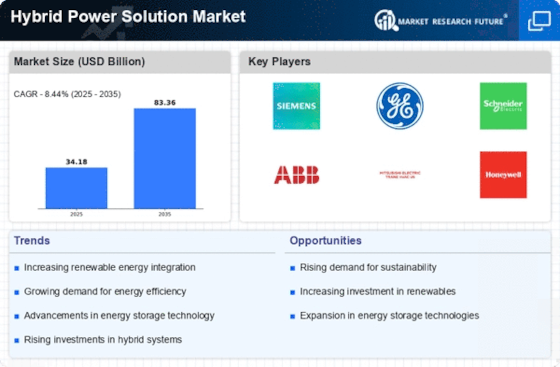Top Industry Leaders in the Hybrid Power Solution Market
*Disclaimer: List of key companies in no particular order
Latest Company Updates:
Competitive Landscape of Hybrid Power Solution Market: A Dynamic Terrain
The global hybrid power solutions market is projected to witness a steady climb, buoyed by rising energy demands, increasing environmental concerns, and technological advancements. This fertile ground fosters intense competition among established players and innovative startups, each vying for a larger slice of the pie. Here, we delve into the competitive landscape, dissecting key player strategies, market share analysis factors, emerging trends, and the overall competitive scenario.
Key Player Strategies:
Market Leaders: Established giants like Siemens Energy, GE, and Vertiv leverage their extensive experience, global reach, and robust portfolios to cater to diverse customer needs. They focus on comprehensive solutions, integrating renewable energy sources with traditional generators, energy storage systems, and intelligent control platforms. Acquisitions and strategic partnerships are common tactics to strengthen their hold on specific segments or expand geographically.
Challengers: Smaller, agile companies like sonnen, SolarEdge, and Sungrow are carving niches with innovative offerings. They specialize in specific technologies like microgrids, battery energy storage, or intelligent inverters, targeting price-sensitive segments or remote locations. These players emphasize modularity, scalability, and ease of installation, making them attractive to off-grid or microgrid applications.
New Entrants: The rise of digital technologies opens doors for technology-driven disruptors. Startups like sonnen eco or Tesla energy are introducing AI-powered energy management systems and virtual power plant platforms, optimizing energy usage and maximizing savings for customers. These players leverage their digital expertise and customer-centric approach to gain traction, particularly in distributed energy markets.
Factors for Market Share Analysis:
Solution Portfolio: The breadth and depth of product offerings play a crucial role. Players with diverse systems addressing various capacity, grid connectivity, and application needs have an edge.
Geographical Presence: Global reach and established local market networks are key to capturing diverse customer segments. Strong presence in high-growth regions like Asia-Pacific and Africa presents lucrative opportunities.
Technological Prowess: Continuous innovation and integration of cutting-edge technologies like AI, IoT, and blockchain attract customers seeking advanced energy management solutions.
Cost Competitiveness: Balancing affordability with quality is crucial. Offering cost-effective solutions without compromising on reliability and performance is essential for market penetration.
Brand Reputation and After-Sales Support: Trust and reliability hold immense value. Building a strong brand image and providing robust after-sales support foster customer loyalty and market share growth.
New and Emerging Trends:
Focus on Microgrids and Distributed Energy: Decentralized energy networks are gaining traction, with hybrid solutions finding favor in remote areas, islands, and communities seeking energy independence.
Integration with Smart Grids: Hybrid systems are increasingly interfacing with smart grids, enabling better grid management, peak demand reduction, and enhanced integration of renewables.
Rise of Energy Storage Solutions: Battery storage technology advancements are making hybrid systems more reliable and cost-effective, leading to a surge in demand for integrated storage solutions.
Focus on Customer-Centric Services: Players are moving beyond hardware, offering financing options, energy management services, and remote monitoring systems, increasing customer value and stickiness.
Overall Competitive Scenario:
The hybrid power solutions market is dynamic and fiercely competitive, with established players, nimble challengers, and disruptive startups actively vying for dominance. While larger companies leverage robust portfolios and global reach, smaller players are carving niches with innovative solutions and digital expertise. Key drivers like technological advancements, increasing focus on microgrids and distributed energy, and growing demand for energy storage are shaping the competitive landscape. Players who adopt adaptable strategies, prioritize innovation, and prioritize customer value will be best positioned to thrive in this evolving market.
Mitsubishi Power Systems Europe Ltd.
- Dec 2023: Mitsubishi Power collaborates with Ørsted on a hybrid power project in Denmark combining offshore wind with natural gas power generation for increased grid stability. (Source: Mitsubishi Power press release)
Siemens AG:
- Nov 2023: Siemens Energy partners with Singapore’s SP Group to develop a hybrid microgrid powered by solar, wind, and energy storage, demonstrating the feasibility of decarbonization in remote islands. (Source: Siemens Energy press release)
NYE Thermodynamics Corporation:
- Aug 2023: NYE Thermodynamics partners with Wartsila on a pilot project integrating its ORC technology with a Wärtsilä biogas engine for efficient power generation from landfill gas. (Source: NYE Thermodynamics website)
Doosan Heavy Industries & Construction Co. Ltd.
- Nov 2023: Doosan Heavy Industries completes the construction of a 120 MW hybrid power plant in Myanmar combining solar and diesel generation for reliable power supply. (Source: Doosan Heavy Industries website)
Top listed global companies in the industry are:
Siemens AG
Mitsubishi Power Systems Europe Ltd.
NYE Thermodynamics Corporation
Doosan Heavy Industries & Construction Co. Ltd.
MJB International
ZTE Corporation
Huawei Technologies Co. LTD
SMA Solar Technology AG










